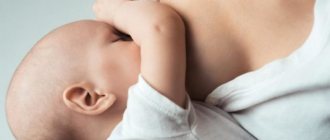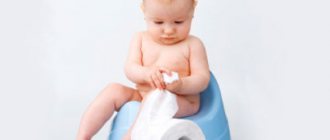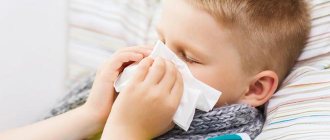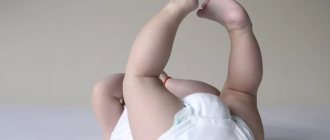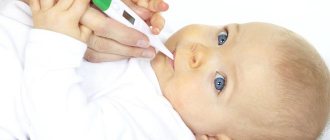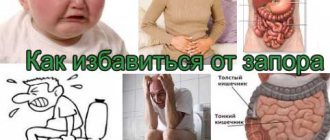Diarrhea in children is a very common disease. Loss of water and salts (electrolytes) can quickly lead to very serious illness, especially in infants, which requires immediate medical attention. This is due to the fact that their immune system cannot yet reliably fight off all pathogens, and the digestive system is still sensitive to disturbances.
What causes diarrhea?
Diarrhea is usually caused by an infection in the intestines. Microbes that cause infection:
- viruses (most common)
- bacteria
- parasites
Viruses
Viral gastroenteritis (often called "stomach flu") is a common illness in children.
This causes diarrhea and, often, nausea and vomiting. Symptoms usually last a few days, but children (especially children) who cannot take in enough fluids may become dehydrated. Rotavirus affects infants and young children and can cause watery diarrhea. Outbreaks are more common during the winter and early spring months, especially in child care settings. The rotavirus vaccine can protect children from this disease.
Enteroviruses such as Coxsackievirus can also cause diarrhea in children, especially during the summer months.
Bacteria
Many different types of bacteria can cause diarrhea, including E. coli, Salmonella, Campylobacter, and Shigella. These bacteria are often responsible for cases of “food poisoning,” which can cause diarrhea and vomiting within hours of exposure.
Parasites
Parasitic infections that can cause diarrhea in children include giardiasis and cryptosporidiosis.
What causes diarrhea in children?
Depending on the cause of diarrhea in a child aged 4 or 5 years, the disease has its own characteristics. So babies are susceptible to an infectious type of intestinal disorder. This diarrhea occurs due to viral and bacterial infections. When a baby does not eat well and his body lacks nutrients, nutritional diarrhea occurs. Therefore, the baby needs to prepare a correct and balanced diet.
Children between 4 and 5 years of age may develop dyspeptic diarrhea. This intestinal disorder occurs when there is insufficient secretion of the digestive organs. Another factor in the appearance of this type of loose stool is considered to be enzyme deficiency. However, children often get sick and suffer infections. In some cases, antibiotics are prescribed for treatment. As a result, drug-induced diarrhea develops. Medicines disrupt the balance of positive bacteria. This leads to dysbiosis.
However, a child between 4 and 5 years old has a risk of getting poisoned by toxic substances. However, malaise also causes food allergies. In this case, a reaction to stale products or individual intolerance is distinguished. In this case, diarrhea occurs due to kidney failure or dysfunction. It is worth noting that the baby can develop neurogenic diarrhea. This problem is associated with impaired intestinal motility. This process occurs due to deviations in neural regulation.
The duration of loose stool in a child aged 4 to 5 years is several days. If diarrhea occurs due to serious reasons, you should consult a doctor. You cannot self-medicate.
What else can cause diarrhea?
Children can sometimes get diarrhea from:
- a diet high in sugar (such as from drinking a lot of juice)
- food allergies
- lactose intolerance
- gut problems such as celiac disease and inflammatory bowel disease (Crohn's disease and ulcerative colitis)
How is diarrhea treated?
Viral diarrhea goes away on its own. Most children with bacterial diarrhea require antibiotic treatment. Parasites always require treatment with antiparasitic drugs.
Children who are not vomiting or dehydrated can continue to eat and drink as usual. Continuing a regular diet may even shorten an episode of diarrhea. You can serve smaller meals until the diarrhea ends.
Do not give your child over-the-counter diarrhea medications unless your doctor tells you to do so.
Urgent help
If a child has severe vomiting, diarrhea and fever, then before the doctor arrives he needs to be given first aid. The main danger with diarrhea and vomiting is rapid dehydration of the child's body. Without first aid, diarrhea can in a couple of hours bring the child to a state requiring urgent resuscitation. Boiled and salted water will replenish the fluid supply in the body, but this is not enough. Along with water, the body loses potassium and sodium, which are responsible for regulating metabolism inside the cell. In addition, during debilitating diarrhea, the intestinal walls suffer, which are no longer able to fully absorb the incoming liquid. Therefore, drinking plain water can only worsen diarrhea, and salted water is an ineffective measure without the intervention of medications. If loose stools appear, you should not try to feed or give your child plenty of water to drink. First you need to call a doctor, and while waiting for him, every ten minutes (in the first two hours) give the baby one dessert spoon of Regidron solution. This powder is sold in pharmacies, divided into dosed sachets with instructions. One packet per liter of water - this is the solution the emergency doctor will give the child to drink. The solution temperature should be room temperature. If you don’t have Regidron in your first aid kit, you can prepare the solution yourself. To do this, you need a liter of boiled water, one tablespoon of salt, 2 tablespoons of sugar or 10 g of glucose, the juice of half a lemon or 3 tablespoons of cranberry juice. If the doctor is away for more than two hours, then you need to increase the portion of liquid and give the child still mineral water or very weak, slightly sweetened tea. As an alternative, a decoction of anti-inflammatory herbs - chamomile, mint or gastric tea - is also suitable. This will ensure unloading of the gastrointestinal tract, reduce the manifestations of toxicosis and replenish the loss of fluid and mineral salts.
What if my child is dehydrated?
For children who show signs of mild dehydration, doctors recommend giving oral rehydration solutions (ORS). They are available at most grocery stores and pharmacies without a prescription and replace body fluids as needed. Your doctor will tell you what to give, how much and for how long. Children should not drink water alone because it does not contain the right mixture of sodium, potassium and other important minerals and nutrients. In some cases, children with severe diarrhea may need intravenous fluids (given into a vein) over several hours to treat dehydration.
Methods for treating diarrhea in a child
Depending on the cause of diarrhea in a child, specific treatment is prescribed. In this case, not only medications are used, but also proper nutrition is prescribed. In addition, it is necessary to maintain the water-salt balance of the child’s body.
Preventing Dehydration
Diarrhea in a baby is accompanied by weakness. To prevent dehydration, parents should pay attention to safe products. In most cases, Regidron is used to restore electrolyte balance. The medicine is sold in powder form. Before use, it is diluted in water.
Regidron is prescribed not only for diarrhea, but also for nausea and vomiting. To prepare the solution, you need to dilute the medicine packet in 1 liter of water. During the day, the baby is given this amount in small portions.
Eliminate Toxins
In most cases, children are prescribed medications that help under any circumstances. Such drugs include sorbent agents. Medicines of this type are aimed at absorbing toxic substances in the body. Enterosorbents are used for food poisoning. In this case, you can give your child the following medications:
- Smecta;
- Activated carbon;
- Enterosgel.
Enterosorbents help both with poisoning from stale food and with intestinal infections.
Medicines for consolidation of stool
Doctors prescribe medications for children with diarrhea that reduce the contractile function of the digestive organ. Such medications have the ability to act quickly. To stop a child's diarrhea, you can give him Loperamide or Imodium. In this case, it is necessary to replenish the electrolyte balance with the help of Regidron. Loperamide tablets can be given to children from 2 years of age. In this case, the instructions indicate the dosage of half a pill.
These medications should not be given to children under 4 years of age. Children under 5 years of age use medications under the supervision of a physician.
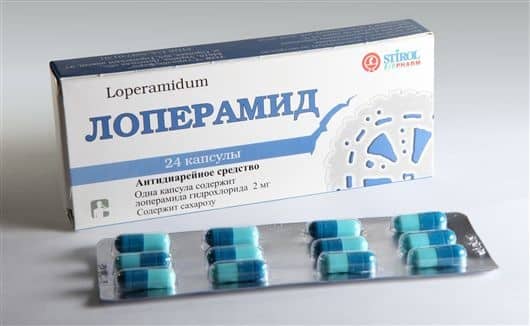
If parents have given their baby one of the above medications, it is necessary to monitor his condition. Otherwise, side effects occur. When your baby develops skin rashes or pain in the abdomen, you should consult a doctor.
Dietary recommendations
For diarrhea in a 4-5 year old child, a diet is prescribed. In this case, parents should provide only approved products to their baby. Also pay attention to frequent meals. The diet includes the following products:
- drying;
- low-fat soups with added cereals;
- dietary types of meat;
- steamed dietary fish;
- skim cheese;
- steamed omelette;
- scrambled eggs;
- fruit juices.
During diarrhea in a child aged 4-7 years, dairy products should not be consumed. Avoid coffee from your diet. Fresh fruits and vegetables should not be consumed. Children with stool upset should not eat dishes with spices, fatty soups and instant foods from cafes. Parents need to ensure that the baby does not eat sweets or drink soda.
For the recovery process, a strict diet for diarrhea lasts up to 4 days. This is done to secure the chair. Food intake should be up to 5 times a day in small portions. The use of folk remedies for proper nutrition is of an auxiliary nature. If help is not provided to the baby in a timely manner, complications arise.
How can you prevent diarrhea?
It is almost impossible to prevent diarrhea in children. But there are a few ways to make this less likely:
- Make sure children wash their hands well and often, especially after using the toilet and before eating. Hand washing is the best way to prevent diarrheal infections that spread from person to person. Dirty hands carry germs into the body when children bite their nails, suck their thumbs, eat with their fingers, or put any part of their hands in their mouth.
- Keep bathroom surfaces such as sinks and toilets clean.
- Wash fruits and vegetables before eating.
- Clean counters and kitchen utensils after handling raw meat, especially poultry.
- Refrigerate meat as soon as possible after you get it home from the store. Cook them until the pink color disappears. Refrigerate any leftovers as soon as possible.
- Never drink from streams, springs or lakes unless local health authorities have verified that the water is safe to drink.
- Avoid washing pet cages or bowls in the same sink you use for food preparation.
- And try to keep pet feeding areas separate from family eating areas.
Prevention
To prevent diarrhea, it is necessary to comply with hygiene requirements:
- Store prepared food products at temperatures below + 5 °C for no more than 24 hours.
- Subject food to good heat treatment.
- Always wash fruits and vegetables before offering them to children.
- When traveling, do not give your child tap water.
- Teach children to wash their hands thoroughly.
- Wash your baby's toys regularly.
- During lactation, mothers must follow a certain diet.
- Introduce complementary foods carefully and gradually.
- Do not create stressful situations in the family.
- Avoid bathing children in public places.
Careful adherence to all hygiene rules does not fully guarantee that the child will not become infected with an intestinal infection. The correct behavior of parents and the good immunity of their children will help to quickly cure diarrhea.
We recommend: What does yellow diarrhea mean in an adult?

